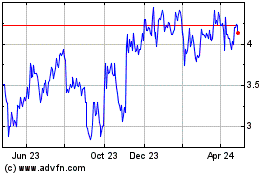According to a Pitney Bowes Survey: 36% of Consumers Will Not Share their Income Data; 76% Will Not Even Share their Politica...
May 31 2012 - 8:30AM
Business Wire
In a Pitney Bowes Inc. (NYSE: PBI) survey conducted in the US,
France, Germany, and the UK, consumers indicated which items of
personal information they are unwilling to share with businesses
and authorities. The results outline four types of data, according
to consumer perceptions. Marketers who may feel overwhelmed by big
data may find guideposts to improved marketing results in these
consumer perceptions.
The first type is transactional. This is data consumers
commonly share and often as part of a basic transaction such as
subscribing to a website, adding themselves to a mailing list or
joining a social media community. Few consumers will withhold
transactional data from a brand or organization. Percentage of
respondents unwilling to share were: Date of Birth (10%); Postal
Address (13%); Email (14%) and Bank Details (22%).
Consumers who will not share their height (22%), weight (24%) or
home phone number (23%) were also a rather small group. This type
of data is physical and, contrary to assumptions about
vanity, are rather willingly shared by consumers.
The data group with the attribute of secure, is held more
closely and shared more rarely with 36% of consumers unwilling to
share their income; 38% unwilling to share their mobile phone
number and 40% unwilling to share their credit card number.
Still, there is a more intimate level of data that covers
attributes and beliefs. This data has a virtual lock and key around
it and brands should be aware of the sensitivity consumers perceive
around these. Political persuasion is none of your business
according to 76% of consumers. Religion has 71% of consumers
unwilling to share. Ethnicity is a taboo subject for 54% and sexual
preference will not be shared by 45% of consumers polled.
According to a report from Forrester Research Inc., “when we
look at consumer activity online, it is clear that although
consumers worry about the collection and use of their online data,
they will continue with online tasks and exchange their data if
they perceive a benefit.”*
“Every marketer must begin with full compliance with all
security and privacy regulations in his or her country. Beyond
that, brands would do well to be aware of these consumer
perceptions as they collect data across all channels,” said Dan
Kohn, Vice President Corporate Marketing for Pitney Bowes Inc. “By
honoring consumer sensitivities across these four archetypes of
data, brand interactions should hit home and multi-channel
marketing metrics may improve dramatically.”
Pitney Bowes helps businesses grow by communicating more
effectively with their customers and prospects. With powerful new
technologies that enable businesses to engage each customer
individually, using whatever channel works best: web, mail, text or
email, marketers improve customer loyalty and grow revenues for
businesses with consumer brands.
To read the full report Getting to Know You, visit
www.personallypb.com.
For marketers taming big data for customer communications,
Pitney Bowes recommends the following six steps:
- Ensure compliance with all local and
federal data regulations and keep up with current legislation.
- Get the basics right (name, address
etc) before trying to develop the customer relationship
further.
- Be clear about your intention. Say why
you would like to know more and explain the benefit of sharing the
data to your customer.
- Understand the limits of your brand. Do
customers come to you because you do a simple service well? If so,
don’t attempt to create a bigger “customer experience” where it may
not be necessary or valued.
- Don’t let data defeat you. Technology
and support exists at every business level.
- Close the loop on communications. Use
what comes back from customers to fuel further conversations and
provide rewards to customers shared their data with you.
About Pitney Bowes
Delivering more than 90 years of innovation, Pitney Bowes
provides software, hardware and services that integrate physical
and digital communications channels. Long known for making its
customers more productive, Pitney Bowes is increasingly helping
other companies grow their business through advanced customer
communications management. Pitney Bowes is a $5.3 billion company
with 29,000 employees worldwide. Pitney Bowes: Every connection is
a new opportunity™. www.pb.com.
# # #
Source: Forrester Research Report: How to Defuse Digital
Marketing Privacy Concerns; Stay Ahead of Privacy Legislation by
Creating a Value-for-Data Exchange. Published May 8, 2012.
Pitney Bowes (NYSE:PBI)
Historical Stock Chart
From Jun 2024 to Jul 2024

Pitney Bowes (NYSE:PBI)
Historical Stock Chart
From Jul 2023 to Jul 2024
